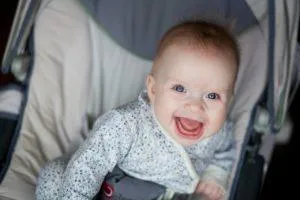Read All About It
Dental Related Articles


Baby’s First Tooth: A Guide To Tooth Eruption
A baby’s first tooth is a significant milestone in its development. And once the first one comes in, the rest are sure to follow. Some babies may get their first tooth around 6 months of age, while others may not get theirs until their first birthday.
Baby teeth come in at different times, but babies should be expected to have all their primary teeth by age 3. The most common teeth to erupt first are the front two lower incisors.
How Many Teeth Do Babies Have?
There are 20 teeth that will erupt in a baby’s mouth, 10 lower and 10 upper. These teeth should grow in until age 3, then start to fall out and make way for adult teeth around age 6.
In What Order Do Baby Teeth Come In?
Babies generally start teething at 6-12 months, but some may begin teething at 4 months or after 12 months.
The first teeth to appear are usually either the two front upper or lower teeth. After these, the opposite front teeth come in, then molars, and lastly, canines.
According to Pampers, baby teeth usually erupt in pairs on each side of either the upper or lower jaw and continue in this pattern until all of them have grown in.
Signs and Symptoms of Tooth Eruption
As a baby’s teeth start to come in, they’ll begin teething. Some of the common symptoms of teething are:
Biting and chewing
Gum rubbing
Increased drooling
Reduced appetite for solids
Irritability/crankiness
It should be noted that symptoms that are not associated with the beginnings of teething are:
Fever
Coughing and congestion
Diarrhea or vomiting
Reduced appetite for liquids
Facial rash
Instead, these symptoms could be indicative of a separate issue. Call your pediatrician if these symptoms progress, as they may indicate your baby is sick.

Is Teething Painful?
It varies from child to child. Some babies don’t experience teething pain at all, while others might have some discomfort, leading them to cry, be irritable, and even have an increase in body temperature.
When your baby begins teething, he or she may experience discomfort or pain. In this case, you can attempt to alleviate the pain by massaging the baby’s gums, using a cool compress, and/or administering pain medication.
Massaging Gums
One way to help your baby with the discomfort of teething is to massage their gums. Take a clean finger and gently massage your baby’s gums, taking care to be gentle while also applying enough pressure. Doing this will increase blood flow to the gum area and help reduce pain and inflammation.
Children with special needs may need a lot of stimulation when teething, but please be aware that giving them teething jewelry is dangerous and these products are not recommended by the FDA. Teething jewelry can lead to choking or strangulation.
Cool Compress
Another option is to provide a cool compress. You can use an item such as a cold spoon or a chilled teething ring and press it to your baby’s gums to reduce inflammation.
Be sure to chill and not freeze teething rings, as these will be too hard against a baby’s gums. Make sure to watch over your baby whenever they are using a teething ring so they don’t accidentally choke on it.
Pain Medication
You can use pain medications to help a baby with teething pain. Over-the-counter medicines like acetaminophen or ibuprofen can help relieve your baby’s pain, but these medications should only be given as directed and only occasionally.
Teething babies may benefit from pain medications, but not all over-the-counter solutions are safe. Pain relievers are okay (if used as directed), but products like topical gels are not. According to Healthline, topical gels can contain certain ingredients such as benzocaine that have been deemed to be harmful to babies.
Topical gels are rubbed on the gums of teething babies, and they contain a numbing agent. This numbing agent is what makes these gels harmful. Once the gel is washed away by saliva, it can travel to and numb the throat, making it hard for your baby to swallow.
Timetable for Baby Tooth Eruption
Here is a timetable that lists each individual baby tooth and when they all should be expected to come in.
Top Teeth
Central incisor – 6 to 10 months
Lateral incisor – 10 to 16 months
Canine – 17 to 23 months
First molar – 14 to 18 months
Second molar – 23 to 31 months
Bottom Teeth
Central incisor – 8 to 12 months
Lateral incisor – 9 to 13 months
Canine – 16 to 22 months
First molar – 13 to 19 months
Second molar – 25 to 33 months
Timetable for Baby Tooth Exfoliation
Here is a timetable that lists when each baby tooth will fall out to make room for adult teeth.
Top Teeth
Central incisor – 6 to 7 years
Lateral incisor – 7 to 8 years
Canine – 10 to 12 years
First molar – 9 to 11 years
Second molar – 10 to 12 years
Bottom Teeth
Central incisor – 6 to 7 years
Lateral incisor -7 to 8 years
Canine – 9 to 12 years
First molar – 9 to 11 years
Second molar – 10 to 12 years

Caring For Baby’s First Tooth
While your baby is teething, it’s important to keep their mouths clean to prevent the buildup of bacteria and food particles. You can do this by taking a clean cloth and rubbing your baby’s gums gently with it twice a day after meals. Once your baby’s first few teeth have erupted, clean them with a soft-bristled toothbrush twice a day.
As your child grows older, you can begin to introduce toothpaste. Be sure that toothpaste is limited to the size of a grain of rice when your child is under the age of 3. After they learn to spit properly, you can give them toothpaste globs the size of a pea.
By your child’s first birthday, it is recommended to start taking them to the dentist for regular checkups.
Learn More
For more information on teething and baby teeth, see our article on the 5 stages of teething. You can also contact us or call us at (205) 969-7454 to learn more!

19 INVERNESS CENTER PARKWAY, STE 250, BIRMINGHAM, AL 35242
TEL: 205.969.7454
E-MAIL: [email protected]
2018 © ALL RIGHTS RESERVED | PRIVACY POLICY | TERMS AND CONDITIONS
Site by Trustway Marketing Powered by Kyrios Systems